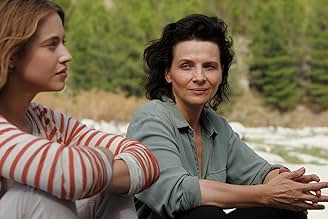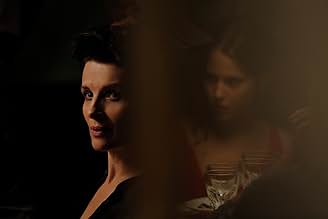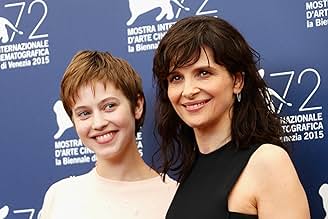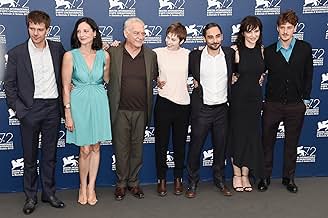IMDb-BEWERTUNG
6,5/10
2678
IHRE BEWERTUNG
Füge eine Handlung in deiner Sprache hinzuA mother unexpectedly meets her son's fiancée at a villa in Sicily and gets to know her as she waits for her son to arrive.A mother unexpectedly meets her son's fiancée at a villa in Sicily and gets to know her as she waits for her son to arrive.A mother unexpectedly meets her son's fiancée at a villa in Sicily and gets to know her as she waits for her son to arrive.
- Auszeichnungen
- 7 Gewinne & 9 Nominierungen insgesamt
Empfohlene Bewertungen
This is a haunting movie, but I think it could have used a tad more plot. Even Binoche's genius for ambiguous facial expressions strains to paper over deficiencies in the story.
I was intrigued to see that it was based on a Pirandello play, but "based" is too strong - it's at best inspired by "La vita che ti diedi", and from what I can tell (I'm not fluent in Italian) the movie omits most of the play's boldest psychological points.
I was intrigued to see that it was based on a Pirandello play, but "based" is too strong - it's at best inspired by "La vita che ti diedi", and from what I can tell (I'm not fluent in Italian) the movie omits most of the play's boldest psychological points.
Without any planning, in the last few days I saw 2 films starring Lou de Laâge and although with completely different characters in both films (L'attesa and Respire) I was pleased with her capacity to enter the role . Juliette Binoche is as always one of the best actresses of her generation and always make great performances. About this L'attesa I can say that although in some parts the film goes a bit too long in the suspense, the story is well written and better represented by the cast. The image plans are very good but sometimes too still. But it is a must see film. A very good work from Francesco Di Giacomo However the story is never totality told to the audience, letting one always thinking ahead.
Plot and character are the classic drivers of cinema but there are other forces of equal impact. Some films are driven more by what does not happen than what does, and photographic technique can transform inaction into deep meaning. This is the case in The Wait (2016), a film title that describes both the story's narrative arc and how it will be experienced by most viewers. Long silent close-ups that record little more than an eyebrow muscle tightening or the strands of hair on a neck are used to convey emotional power of surprising intensity.
Based entirely on the interaction between two women and the inability of one to reveal a painful truth to the other, the plot and character range is unusually sparse. The story opens with a funeral and the palpable raw grief on the face of a mother who has lost a son. Anna (Juliette Binoche) is in a deep dark place when she takes a call from beautiful young Jeanne (Lou de Laage) who asks why her son Giuseppe did not meet her at the airport. Anna invites Jeanne to wait for him at the Sicilian family villa, knowing he will never come. The pair move from a strained and awkward start to a warm friendship, all the while with Jeanne confused and Anna struggling with suppressed emotional turmoil. Anna has Giuseppe's cell phone and listens to Jeanne's desperate calls to her son, but withholding the truth gives him a tangible presence that keeps him alive and eases Anna's pain. For as long as she can gaze upon Jeanne, she can see through her dead son's eyes and share his delight in her innocence and charm.
This story rests entirely on the extraordinary ability of its two stars to convey the full gamut of emotion with total authenticity. The face of Binoche in particular is like a canvas onto which she paints every colour of the rainbow, with subtle shifts of expression that span joyful laughter to the very edge of sanity. Many viewers will find this a difficult film to watch because of the gradually escalating tension created by Anna holding back the truth from Jeanne, and this transforms the drama into a psychological thriller. It is impossible not to judge Anna or not to consider how we would handle such a situation, and this self-reflective process only heightens tensions both inside the film and within ourselves. The performances could easily have slipped into a melodrama, but instead, the minimalist dialogue and slow pace creates an open space into which is hung a finely wrought portrait of parental grief.
Based entirely on the interaction between two women and the inability of one to reveal a painful truth to the other, the plot and character range is unusually sparse. The story opens with a funeral and the palpable raw grief on the face of a mother who has lost a son. Anna (Juliette Binoche) is in a deep dark place when she takes a call from beautiful young Jeanne (Lou de Laage) who asks why her son Giuseppe did not meet her at the airport. Anna invites Jeanne to wait for him at the Sicilian family villa, knowing he will never come. The pair move from a strained and awkward start to a warm friendship, all the while with Jeanne confused and Anna struggling with suppressed emotional turmoil. Anna has Giuseppe's cell phone and listens to Jeanne's desperate calls to her son, but withholding the truth gives him a tangible presence that keeps him alive and eases Anna's pain. For as long as she can gaze upon Jeanne, she can see through her dead son's eyes and share his delight in her innocence and charm.
This story rests entirely on the extraordinary ability of its two stars to convey the full gamut of emotion with total authenticity. The face of Binoche in particular is like a canvas onto which she paints every colour of the rainbow, with subtle shifts of expression that span joyful laughter to the very edge of sanity. Many viewers will find this a difficult film to watch because of the gradually escalating tension created by Anna holding back the truth from Jeanne, and this transforms the drama into a psychological thriller. It is impossible not to judge Anna or not to consider how we would handle such a situation, and this self-reflective process only heightens tensions both inside the film and within ourselves. The performances could easily have slipped into a melodrama, but instead, the minimalist dialogue and slow pace creates an open space into which is hung a finely wrought portrait of parental grief.
This visually beautiful, if self-consciously arty, Italian film marks the feature debut of Piero Messina who certainly displays all the promise of a major film-maker if he can only learn to move things along at a somewhat more acceptable pace and be less concerned with the 'look' of his films and more concerned with the feelings of his characters. This is a somewhat high-toned piece based on a play by Pirandello and it's very much designed around the performances of Juliette Binoche as a grieving mother and Lou de Laage as her son's girlfriend. It's certainly well done but it also smacks of the worst kind of art-house cinema; this is Antonioni-light. See it by all means though you may have to keep pinching yourself from time to time to stay awake.
"The Wait" ("L'Attesa") is a film that has really nice acting but the story itself didn't do much for me. Its vague ending left me cold and the behaviors of the leading lady, Anna (Juliet Binoche) just didn't make a lot of sense--regardless of what REALLY happened at the end.
When the film begins, Jeanne (Lou de Laâge) arrives at a Sicilian villa and instead of being greeted, she's given a meal by a servant and then retires to bed without seeing the woman of the house, Anna. The next day, Jeanne comes downstairs and finds that there's been some sort of funeral...and Jeanne tells her it's because her brother died...though it's pretty obvious that this might NOT be the truth. Jeanne has come to see Anna's son and spend her vacation with him....but through the course of the film, the son never arrives and Jeanne is feeling abandoned...though Anna and her seem to have a few moments together bonding.
Where does all this go? Well, as I mentioned above, the ending is a bit vague and it's easy to see two very different interpretations. I didn't really care about either one because Anna's actions simply didn't make much sense....and because of that the film lost me. Well acted, this film needed some better writing as the characters didn't always seem realistic or believable.
When the film begins, Jeanne (Lou de Laâge) arrives at a Sicilian villa and instead of being greeted, she's given a meal by a servant and then retires to bed without seeing the woman of the house, Anna. The next day, Jeanne comes downstairs and finds that there's been some sort of funeral...and Jeanne tells her it's because her brother died...though it's pretty obvious that this might NOT be the truth. Jeanne has come to see Anna's son and spend her vacation with him....but through the course of the film, the son never arrives and Jeanne is feeling abandoned...though Anna and her seem to have a few moments together bonding.
Where does all this go? Well, as I mentioned above, the ending is a bit vague and it's easy to see two very different interpretations. I didn't really care about either one because Anna's actions simply didn't make much sense....and because of that the film lost me. Well acted, this film needed some better writing as the characters didn't always seem realistic or believable.
Wusstest du schon
- Wissenswertes"L'attesa" is a period of time whose duration is unknown and therefore it symbolizes a real act of faith. In this case, this act for Anna and Jeanne consists in waiting for the return of Giuseppe, the son of Anna and Jeanne's boyfriend, with the difference that the first knows the truth, while the second lives in the mystery. The return of Giuseppe takes on the meaning of a miracle. The song "Waiting for the miracle" emphasizes this detail.
- PatzerAbout one half hour into the movie Binoche cracks an egg into a frying pan, thereby breaking the yolk. However, when she serves it to her son's girlfriend the yolk is whole.
- Zitate
Anna Remigi: Jealousy means that there is still desire.
- VerbindungenFeatures Arrangiatevi (1959)
- SoundtracksOrchestral Loop
Music by Ben Lukas Boysen
Published by Erased Tapes Music
Top-Auswahl
Melde dich zum Bewerten an und greife auf die Watchlist für personalisierte Empfehlungen zu.
- How long is L'attesa?Powered by Alexa
Details
Box Office
- Budget
- 3.200.850 € (geschätzt)
- Bruttoertrag in den USA und Kanada
- 55.804 $
- Eröffnungswochenende in den USA und in Kanada
- 5.686 $
- 1. Mai 2016
- Weltweiter Bruttoertrag
- 1.010.766 $
- Laufzeit
- 1 Std. 40 Min.(100 min)
- Farbe
- Seitenverhältnis
- 2.35 : 1
Zu dieser Seite beitragen
Bearbeitung vorschlagen oder fehlenden Inhalt hinzufügen

















